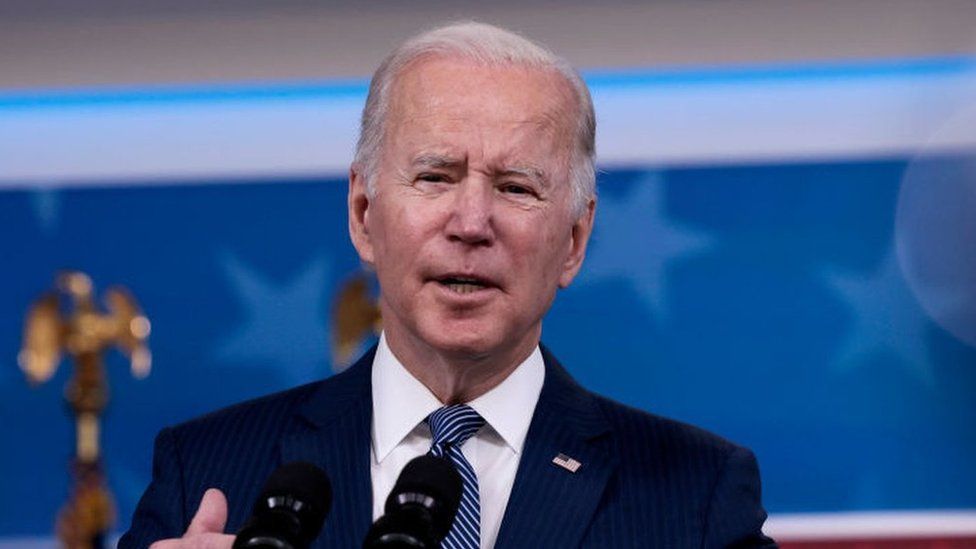Economy
Biden says economy 'in strong shape' ahead of holidays – BBC News


The US economy is in a strong position, President Joe Biden has said, thanks to action taken by the government to free up supply chain blockages and tackle the rising cost of living.
He predicted that prices, which have been rising sharply, would ease.
“We’re heading into a holiday season on very strong shape,” he said. “It’s not because of luck,”
Asked how supply chains would weather disruption from the new variant of coronavirus, President Biden said he was an “optimist”, but that it was too soon to know what the impact might be.
As a result of the economic recovery a typical American family was now better off than before the pandemic struck, the president said, describing a 40% reduction in child poverty as “a moral victory”.
“Americans on average have about $100 (£75.33) more in their pockets every month than they did last year [and] about $350 more each month than they did before the pandemic, even after accounting for inflation,” the president said.
Since taking office, the Biden administration has pumped billions of dollars of stimulus into the US economy, including direct cheques to households and tax breaks.
Economic growth has rebounded as the impact of the pandemic began to ease, and after shrinking 30% in the first six months of 2020, the economy is now back at the size it was pre-pandemic.
However, higher demand for goods, and on-going disruptions to the supply and delivery of those goods, has helped push inflation up to 6.2% – the highest it has been for 31 years.
“I’ve used every tool available to address the price increases,” President Biden said.
Releasing part of the US’s oil reserves last month, in an action coordinated with several other nations, to try to bring down the price of fuel had been “making a difference”, he added.
Independent economic analysis indicated his Build Back Better bill would reduce inflationary pressures, he stressed.
The bill was fully paid for, and would contribute to deficit reduction, by “making the largest corporations and the richest Americans pay a little more in taxes”.
A change in mindset
The $1.9tn (£1.4tn) Build Back Better bill, which includes social and climate spending, still needs to be voted on in the US Senate.
Asked why he believed he would be able to bring down inflation when previous administrations in the 1970s and 1980s failed, the president said: “This is the first time I’ve seen labour and business so ready to cooperate.
“People are in a different state of mind than in the Carter and Nixon years.”
Earlier this week, President Biden hosted the chief executives of several of the countries’ largest manufacturers and retailers, including Walmart and CVS Health, Mattel and Best Buy.
The executives reported that their inventories were up and shelves well-stocked, ready to meet the consumer demand for the holidays, he said.


Biden said the administration had “broken up log jams” in the supply chain through various methods, such as by encouraging port operators to work longer hours.
He also pointed to the easing of rules over truck drivers’ hours. The measures were working, he said, with the number of containers left sitting on docks for over eight days down by 40%.
Michael Pearce, US economist at Capital Economics, thinks the president was right to suggest that some of the stresses on the economy were starting to ease, but that all the problems wouldn’t go away overnight.
“It’s still the case that there are very severe supply problems. Even if they’re starting to fade, it’ll take some time for that to work its way through, especially now that inventory for a lot of goods is so lean,” he told the BBC.
Inflation which remained would therefore persist well into next year, he said, in part thanks to the trillions of dollars pumped into the economy through the pandemic.
The Omicron variant, and expectations that it will hurt economic growth, were probably having a greater impact on the price of fuel, than the move to release oil reserves, Mr Pearce added.
Diane Swonk, chief economist at Grant Thornton, thinks Mr Biden’s Build Back Better bill could have a pro-inflationary impact in the short term unless it was tweaked further by lawmakers.
She felt Omicron, the easing of supply chain problems, and a reduction in government stimulus over the coming months would “take the steam out of inflation but it won’t cool it down enough”.
“The risk is until we can really wrestle the virus to its knees we’ll continue to see disruption, even as demand starts to slow again,” said Ms Swonk.
“We’re starting to see more broader based inflation that likely will linger longer.”
Economy
Poland has EU's second highest emissions in relation to size of economy – Notes From Poland
[unable to retrieve full-text content]
Poland has EU’s second highest emissions in relation to size of economy Notes From Poland





Source link
Economy
IMF's Georgieva warns "there's plenty to worry about'' in world economy — including inflation, debt – Yahoo Canada Finance

WASHINGTON (AP) — The head of the International Monetary Fund said Thursday that the world economy has proven surprisingly resilient in the face of higher interest rates and the shock of war in Ukraine and Gaza, but “there is plenty to worry about,” including stubborn inflation and rising levels of government debt.
“ Inflation is down but not gone,” Kristalina Georgieva told reporters at the spring meeting of the IMF and its sister organization, the World Bank. In the United States, she said, “the flipside” of unexpectedly strong economic growth is that it ”taking longer than expected” to bring inflation down.
Georgieva also warned that government debts are growing around the world. Last year, they ticked up to 93% of global economic output — up from 84% in 2019 before the response to the COVID-19 pandemic pushed governments to spend more to provide healthcare and economic assistance. She urged countries to more efficiently collect taxes and spend public money. “In a world where the crises keep coming, countries must urgently build fiscal resilience to be prepared for the next shock,” she said.
On Tuesday, the IMF said it expects to the global economy to grow 3.2% this year, a modest upgrade from the forecast it made in January and unchanged from 2023. It also expects a third straight year of 3.2% growth in 2025.
ADVERTISEMENT
The world economy has proven unexpectedly sturdy, but it remains weak by historical standards: Global growth averaged 3.8% from 2000 to 2019.
One reason for sluggish global growth, Georgieva said, is disappointing improvement in productivity. She said that countries had not found ways to most efficiently match workers and technology and that years of low interest rates — that only ended after inflation picked up in 2021 — had allowed “firms that were not competitive to stay afloat.”
She also cited in many countries an aging “labor force that doesn’t bring the dynamism” needed for faster economic growth.
The United States has been an exception to the weak productivity gains over the past year. Compared to Europe, Georgieva said, America makes it easier for businesses to bring innovations to the marketplace and has lower energy costs.
She said countries could help their economies by slashing bureaucratic red tape and getting more women into the job market.
Paul Wiseman, The Associated Press
Economy
Nigeria’s Economy, Once Africa’s Biggest, Slips to Fourth Place – BNN Bloomberg


(Bloomberg) — Nigeria’s economy, which ranked as Africa’s largest in 2022, is set to slip to fourth place this year and Egypt, which held the top position in 2023, is projected to fall to second behind South Africa after a series of currency devaluations, International Monetary Fund forecasts show.
The IMF’s World Economic Outlook estimates Nigeria’s gross domestic product at $253 billion based on current prices this year, lagging energy-rich Algeria at $267 billion, Egypt at $348 billion and South Africa at $373 billion.
Africa’s most industrialized nation will remain the continent’s largest economy until Egypt reclaims the mantle in 2027, while Nigeria is expected to remain in fourth place for years to come, the data released this week shows.
Nigeria and Egypt’s fortunes have dimmed as they deal with high inflation and a plunge in their currencies.
Bola Tinubu has announced significant policy reforms since he became Nigeria’s president at the end of May 2023, including allowing the currency to float more freely, scrapping costly energy and gasoline subsidies and taking steps to address dollar shortages. Despite a recent rebound, the naira is still 50% weaker against the greenback than what it was prior to him taking office after two currency devaluations.
Read More: Why Nigeria’s Currency Rebounded and What It Means: QuickTake
Egypt, one of the emerging world’s most-indebted countries and the IMF’s second-biggest borrower after Argentina, has also allowed its currency to float, triggering an almost 40% plunge in the pound’s value against the dollar last month to attract investment.
The IMF had been calling for a flexible currency regime for many months and the multilateral lender rewarded Egypt’s government by almost tripling the size of a loan program first approved in 2022 to $8 billion. This was a catalyst for a further influx of around $14 billion in financial support from the European Union and the World Bank.
Read More: Egypt Avoided an Economic Meltdown. What Next?: QuickTake
Unlike Nigeria’s naira and Egypt’s pound, the value of South Africa’s rand has long been set in the financial markets and it has lost about 4% of its value against the dollar this year. Its economy is expected to benefit from improvements to its energy supply and plans to tackle logistic bottlenecks.
Algeria, an OPEC+ member has been benefiting from high oil and gas prices caused first by Russia’s invasion of Ukraine and now tensions in the Middle East. It stepped in to ease some of Europe’s gas woes after Russia curtailed supplies amid its war in Ukraine.
©2024 Bloomberg L.P.
-



 Science7 hours ago
Science7 hours agoJeremy Hansen – The Canadian Encyclopedia
-



 Investment7 hours ago
Investment7 hours agoUK Mulls New Curbs on Outbound Investment Over Security Risks – BNN Bloomberg
-



 Health21 hours ago
Health21 hours agoSupervised consumption sites urgently needed, says study – Sudbury.com
-



 Tech6 hours ago
Tech6 hours agoSave $700 Off This 4K Projector at Amazon While You Still Can – CNET
-
Real eState6 hours ago
Sick of Your Blue State? These Real Estate Agents Have Just the Place for You. – The New York Times
-



 Tech5 hours ago
Tech5 hours ago'Kingdom Come: Deliverance II' Revealed In Epic New Trailer And It Looks Incredible – Forbes
-



 Sports5 hours ago
Sports5 hours agoAuston Matthews denied 70th goal as depleted Leafs lose last regular-season game – Toronto Sun
-
News20 hours ago
Canada's 2024 budget announces 'halal mortgages'. Here's what to know – National Post




